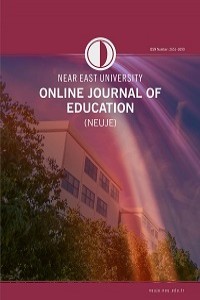EXAMINATION OF TEACHERS’ OPINIONS ABOUT HOMESCHOOLING SERVICE
EXAMINATION OF TEACHERS’ OPINIONS ABOUT HOMESCHOOLING SERVICE
homeschooling, focus group discussion,
___
- Apple, M. (2000). The cultural politics of home schooling. Peabody Journal of Education, 75(2), 256-271. Basham, P., Merrified, J., & Hepburn, Claudia R. (2007). Home schooling: From the extreme to mainstream. Vancouver: The Fraser Institute. Brabant, C., Bourdon, S., & Jutras, F. (2003). Home education in Quebec: Family first. Evaluation & Research in Education, 17(2-3), 112-131. Birkan, B. (2002). Erken ozel egitim hizmetleri. Ankara Universitesi Egitim Bilimleri Fakultesi Ozel Egitim Dergisi, 3(2), 99-109. Collom, E. (2005). The ins and outs of homeschooling: The determinants of parental motivations and student achievement. Education and Urban Society, 37(3), 307-335. Evde ve Hastanede Egitim Hizmetleri Yonergesi, (2010). Retrieved from https://orgm.meb.gov.tr/meb_iys_dosyalar/2012_10/02031840_evde_hastanede_egitim _hiz_yonergesi.pdf on 01.04.2019. English, R. M. (2013). The most private private education: Home education in Australia. Homeschool Researcher, 29(4), 1-7. ERG. (2014). Turkiye egitim sisteminde esitlik ve akademik basari arastirma raporu ve analiz. IIstanbul: Egitim Reformu Girisimi. Erturk, S. (1997). Egitimde program gelistirme. Ankara: Meteksan. Fields-Smith, C., & Williams, M. (2009). Motivations, sacrifices, and challenges: Black parents’ decisions to home school. The Urban Review, 41(4), 369-389. Gozun, O., & Yikmis, A.(2004). Ilkogretim mufettislerinin kaynastirma uygulamasina iliskin gorus ve onerileri. Ankara Universitesi Egitim Bilimleri Fakultesi Ozel Egitim Dergisi, 5(2), 79-88. Korkmaz, H., & Duman, G. (2014). Public understanding about homeschooling: A preliminary study. Procedia-Social and Behavioral Sciences, 116, 3891-3897. Knuth, J. D., & Johnson, S. A. (2010). A descriptive analysis of homeschooling children with autism (Doctoral Dissertation). California State University, Sacramento. Lubienski, C. (2003). A critical view of home education. Evaluation & Research in Education, 17(2-3), 167-178. Ozel Egitim Hizmetleri Yonetmeligi, (2018). Retrieved from https://orgm.meb.gov.tr/meb_iys_dosyalar/2018_07/09101900_ozel_egitim_hizmetleri _yonetmeligi_07072018.pdf on 20.03.2019. Petrie, A. (1995). Home education in Europe and the implementation of changes to the law. International Review of Education, 47(5), 477-500. Princiotta, D., Bielick, S. & Chapman, C (2006). Homeschooling in the United States. Washington, DC: U.S. Department of Education, National Center for Education Statistics. Ray, B. D. (2000). Home schooling: The ameliorator of negative influences on learning?. Peabody Journal of Education, 75 (1/2), 71-106. Tasdemir, M., & Bulut, A. S. (2015). Ev okulu uygulamasi uzerine bir durum calismasi: Kuram ve ozel eggitimde uygulama. International Journal of Eurasia Social Sciences, 6(19), 138-157. Terry, B. K. (2011). Homeschooling in America a viable option. Retrieved from https://files.eric.ed.gov/fulltext/ED517220.pdf on 10.03.2019. Winstanley, C. (2009). Too cool for school? Gifted children and homeschooling. Theory and Research in Education, 7(3), 347‐362. Yildirim, A., & Simsek, H. (2008). Nitel arastirma yontemleri. Ankara: Seckin Yayincilik. Yildirim, N. (2011). Ogretim surecinde bulunan ogrencilerde gorulen suregen hastaliklar uzerine yonetimsel degerlendirme: Tokat ili ornegi. Balikesir University Journal of Social Sciences Institute, 14(25), 69-85. Yildirim, N., Talas, S., Yazici, L., Nural, H., Celebi, I., Cetin, K., & Caylak, M. (2015). Evde egitim alan ogrencilerin egitim sureclerinin degerlendirilmesi (Tokat Ili Ornegi). Egitim Kuram ve Uygulama Arastirmalari Dergisi, 1(1), 33-52.
- ISSN: 2651-3099
- Başlangıç: 2018
- Yayıncı: Yakın Doğu Üniversitesi
Secondary Education Teachers and School Administrators’ Views on Positive Organizational Climate
Yücehan YÜCESOY, Burak DEMİR, Başak BAĞLAMA, Mert BAŞTAŞ, Behçet ÖZNACAR
THE ROLE OF FOREIGN LANGUAGE TEACHING IN ENHANCING STUDENTS’ INTERCULTURAL COMPETENCE
EUROPEAN FOREIGN LANGUAGE TEACHING POLICY WITH THE USE OF TECHNOLOGY
Hassan Ahmed Sharif AHMED SHARİF
THE EUROPEAN POLICY ABOUT TRAINING STUDENTS OF LANGUAGES
EXAMINATION OF TEACHERS’ OPINIONS ABOUT HOMESCHOOLING SERVICE
